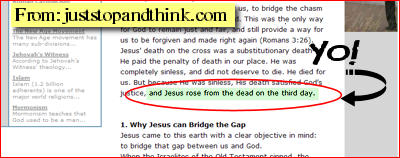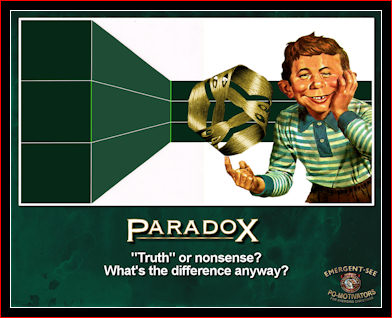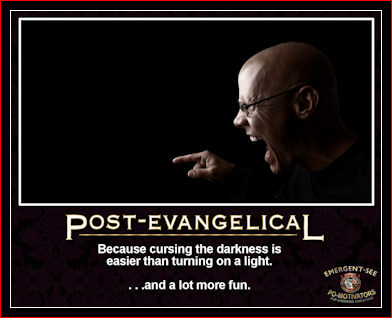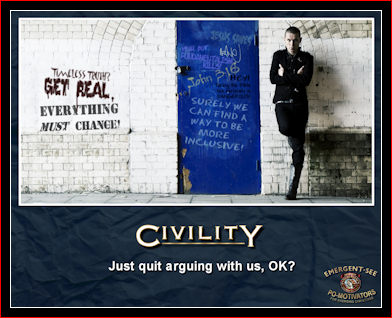by Phil Johnson


et me start by saying I'm amazed at the amount of debate, the level of rancor, and the degree of polarization over
a 15-minute film that appears to have been around for more than a year.
Actually, some of the
questions that have been raised in this discussion are good ones (and important, too). The discussion itself is by no means pointless.

But in my judgment (based mainly on what has been posted right here in the comments section of this blog), the
way some of the various arguments are being set forth is an utterly fruitless approach to discussing differences between people who in fact
do already agree on all the
essential points of gospel truth.
Let me be specific about what troubles me. Some of the labeling we've seen (replete with fatuous references to Finney and Pelagianism) appears to be little more than thinly-disguised name-calling devoid of any cogent argumentation. Moreover, the rapid (and rabid) polarization on both sides is disturbing. Almost as soon as this issue was raised, two opposing squads took their respective sides, with people on both teams exaggerating their differences, overstating the importance of those differences, and hyperbolizing the egregiousness of the other side's "error." Some of the commenters here leapfrogged completely over the civilized exchange of opinions and went straight to
DEFCON 1. Rhetoric of that type unwittingly and unnecessarily supports the prejudices of those who imagine that there's a sinister principle in Calvinism that automatically makes Calvinists harsh and cantankerous. (See
here for more on that subject.)
Now, remember: I'm not opposed to
vigorous disagreement, appropriate labeling, or even
ridicule and sarcasm in contexts where such things are clearly warranted. Elijah did not sin by mocking the Baal-priests and their followers, and Paul was perfectly right to employ über-harsh language about the Judaizers (cf. Galatians 1:8-9; 5:12).
But Elijah was dealing with pagan priests and Paul was dealing with wolves in sheep's clothing. Surely we ought to deal differently with evangelical brethren when our chief complaint is that their Calvinism is short by a point or two, or that they neglected to make explicit mention of this or that truth in an evangelistic context—
especially when it is clear that they have no obvious agenda to downplay any essential gospel doctrine and have in fact clearly affirmed the "missing" point somewhere else in the immediate context.

There's a lot that I'd like to say about the
doctrinal issues under discussion in this conflict. And I'll probably devote a couple of follow-up posts to that. In the process, I hope to make one thing clear: Some of the questions raised in this discussion have no easy, obvious answers, and those who think otherwise usually
lose their balance. I see three examples of that in this discussion:
- We have a few commenters who lean toward Arminian theology (or worse) and insist that God loves everyone just the same and with equal fervor, and whether anyone gets saved or not is ultimately beyond God's power to determine. They think He's done everything He can possibly do to save everyone, and now the choice is left up to each individual. Meanwhile, God is helpless to do anything other than beg sinners to make the right choice.
- Then we have some Calvinists who think it's obvious that God's only attitude toward those whom He did not elect unto salvation is pure and undiluted hatred. These people think anyone who speaks of divine "love" toward the reprobate are only pseudo-Calvinists, and are actually undermining the truth of the gospel itself.
- Then there's a third group: Calvinists of the very softest sort, who think anyone who denies that there's a redemptive intent in God's attitude toward the reprobate are hyper-Calvinists and utter miscreants who have a deliberate agenda to undermine the gospel in a totally different direction. Theirs is a minority opinion, perhaps, but their rhetoric is equally harsh and their position equally narrow.
I side with
none of those views, and my position has in fact been either misinterpreted or misrepresented by all three sides at various times and in various ways.
But setting the doctrinal issues aside for the moment, this post will just address some more immediate issues, which are relatively trivial and easy to answer. Let me give my opinions under three headings:
1. Regarding Francis Chan and TMS
 I don't know Francis Chan personally. Aside from having watched the video in question, I have had zero personal exposure to him or his preaching. In fact, the first time I saw the video, I didn't even realize whom I was watching. (Nothing on this page or in the video's opening sequence tells you anything about the person who is doing the talking.) I'd heard of Francis Chan, of course, because he pastors in Simi Valley, a short half hour from where I live and work. I have had a few friends involved with his ministry. For some reason, I envisioned him as an older man.
I don't know Francis Chan personally. Aside from having watched the video in question, I have had zero personal exposure to him or his preaching. In fact, the first time I saw the video, I didn't even realize whom I was watching. (Nothing on this page or in the video's opening sequence tells you anything about the person who is doing the talking.) I'd heard of Francis Chan, of course, because he pastors in Simi Valley, a short half hour from where I live and work. I have had a few friends involved with his ministry. For some reason, I envisioned him as an older man.
Pastor Chan has a fine reputation as a pastor and communicator. Everything I have ever heard about him from people who have worked with him and attended his church is completely positive. I know nothing about the nuances of his theological persuasion other than what I have gleaned from his website. His doctrinal stance seems to reflect substantial if not complete agreement with the doctrinal statement of the Master's Seminary. Although he is apparently not as rigorous in his Calvinism as I would be, that would be true of lots of men whom I nevertheless respect, including a few men who have been major influences in my life.
See: No matter what you may have heard about me from the dark side of the blogosphere, I have never anathematized anyone merely for being less Calvinistic than I am. In my assessment, the vital litmus test of whether someone is sound in the gospel or not is the question of whether he acknowledges Christ's righteousness as the sole and sufficient ground of justification rather than trying to fudge on the principle of sola fide or making something the sinner himself must do a part of the ground of final justification.
(Incidentally, by that measure, which I believe is biblical, one's view of imputation and penal substitution would be vital; but one's view of the extent of the atonement would be less so. That is precisely my perspective. More on that in a subsequent post, perhaps.)
Last week I was asked privately by an individual who is fairly new to the blog whether there is some kind of "political" pressure on me not to be critical of anyone who has earned a degree from The Master's Seminary. This guy wondered if I was trying to avoid jumping into the fray for that reason. My answer: Absolutely not. Anyone who reads the blog can see that I have never given TMS alums a free pass. If anything, some of my most forthright and vigorous polemical remarks have been aimed at some doctrinally freewheeling TMS graduates—especially a few who seem enthralled with certain currently-stylish flavors of epistemological skepticism.
 But notice the disclaimer at the bottom of my original blog. It applies here at the group blog, too. I bear sole responsibility for what I post here. Some of my opinions on peripheral issues may not necessarily reflect the views of my pastor, my employer, my wife, my children, or my friends. Only my beagle, Wrigley, always agrees with me.
But notice the disclaimer at the bottom of my original blog. It applies here at the group blog, too. I bear sole responsibility for what I post here. Some of my opinions on peripheral issues may not necessarily reflect the views of my pastor, my employer, my wife, my children, or my friends. Only my beagle, Wrigley, always agrees with me.
I should note that neither John MacArthur, the elders of Grace Church, nor anyone on the faculty at TMS has ever raised a peep of protest about anything I have posted on my blog, though I am certain virtually all of them could find things they would disagree with if they read the blog exhaustively. But even when we disagree, we respect one another's positions, and we grant one another the privilege of speaking candidly.
We do, however, emphatically agree on what is essential to the gospel.
2. Regarding the Video
As I said, when I first watched Francis Chan's video, I did not even realize I was watching Francis Chan. My initial reaction in the first two minutes or so was, Here we go again. This is a Nooma knockoff, and it's going nowhere. So my initial expectations were less than nil.
But when Pastor Chan began talking about God as Creator, the Ten Commandments, sin, the justice of punishment for sin, how Christ's atonement vicariously paid the penalty of others' sin, the holiness and wrath of God—and several other aspects of the gospel that are often denied or deliberately sidestepped nowadays—my perspective changed, and I came away with a much higher opinion of the video. Its production values are (to my eye) superb. Pastor Chan's delivery is engaging. His passion is infectious. And he said some things that did make me "stop and think." That's pretty much what Frank Turk said in his response to the video, so when I read Frank's comments about it, I wasn't the least bit surprised or puzzled. That's why I'm on Frank's side here. I think I understand what he was saying and why—and I do agree with him.
I likewise agreed with Dan Phillips's post-mortem on the original flap the other day. That (plus the fact that I really am busy) is why I haven't posted anything about it until now. I thought my teammates had already said everything that really needed to be said.
That doesn't mean I liked everything about the video. In all candor, there were some things in it that made me cringe. Most of these were essentially the same faults James White highlighted last week on his Webcast. In fact, I would pretty much agree with the objective content of most of the criticisms that have been leveled at the film.
But I'm embarrassed by the shrill tone and dismissive attitudes of some of the critics in our meta. Specifically, I think those who insist that the film's defects amount to a fatal and deliberate compromise of the gospel are pretty far over the top. Histrionics without an actual argument don't ordinarily sway me.
Anyway, while I understand and agree with some of the main points that have been made by both admirers and critics of the video, at the end of the day, if Pastor Chan's video hadn't become a matter of heated controversy in the blogosphere (with several persistent people practically demanding that I declare my opinion) I personally would not have singled the video out either for special praise or special criticism.
If I'd been handed the script to Pastor Chan's video before he filmed it and asked to give editorial input, I would have offered several significant suggestions. But of course, that's what I do all the time. It's the nature of being an editor. Rarely do I see anything I don't feel compelled to tweak just a little—including my own blogposts after I've posted them. (Sorry, Challies.)
So I won't list everything I might have changed about the video, because this post is running long already. But here are a couple of typical examples: I absolutely agree with whoever said the expression "God is crazy about you" is stunningly inappropriate. I also don't like some of the language and imagery the film uses to describe God's well-meant proposals of mercy to sinners. I especially think it bungles and confuses the point of the church as Christ's bride (and the Father's role in choosing and presenting the bride to His Son) by making God the Father sound like a desperate suitor seeking sinners' love for His own sake.
On the other hand, I strongly disagree with those critics who claim it is inappropriate ever to portray God as pleading with sinners for their repentance and reconciliation. (And I hope to follow up on that point in a future post.)
My point here, however, is that none of my complaints about the video would have warranted a major blogpost or a public protest about the film. I seriously think it's a stretch to accuse Francis Chan of denying any essential Christian doctrine or deliberately twisting the gospel.
In fact, I have a much higher opinion of the way Pastor Chan is doing evangelism than I have of the way some of his critics are neglecting it. Chan and his congregation, by all accounts, are actually reaching out to their community. Some of his critics seem to be focusing their ministries more and more to an increasingly narrow and theologically inbred audience—preaching more and more to the choir and saying less and less to a lost and needy world.
Dan Phillips said something to me about all this that I think is absolutely spot on: The sad thing is that whereas a lot of people might be prone to look at the natural and easy way Pastor Chan speaks to unbelievers about Christ—and think, I could do that; the feeding frenzy of overweening critics is likely to make them think the opposite.
3. Regarding the Proper Proclamation of the Gospel
 I'm concerned about the increasing number of Calvinists in this generation who seem to bristle and balk whenever they hear someone speak of the love and compassion of God for all humanity. Some of them in effect seem to deny every aspect of God's love other than God's redemptive purpose for the elect alone. I think that's a serious mistake. (See yesterday's Spurgeon excerpt.)
I'm concerned about the increasing number of Calvinists in this generation who seem to bristle and balk whenever they hear someone speak of the love and compassion of God for all humanity. Some of them in effect seem to deny every aspect of God's love other than God's redemptive purpose for the elect alone. I think that's a serious mistake. (See yesterday's Spurgeon excerpt.)
Push that view too far, deny that God's indiscriminate pleas to sinners are well-meant, and you corrupt the gospel message just as badly as those who want to eliminate the wrath or righteousness of God from the message.
This, I think, is the most important question that has been raised in the flap over Francis Chan's video. I want to talk about it in some upcoming blogposts. In the meantime, let me give everyone a reading assignment that I think will be immensely helpful. Erroll Hulse wrote a wonderful book called The Great Invitation: Examining the Use of the Altar Call in Evangelism. In it, he discusses the question of whether it is ever appropriate to tell sinners indiscriminately that God loves them and wants them to repent and be reconciled to Him. It's a marvelously balanced approach to the whole question, from a Calvinist who is defending the doctrines of election, the sovereignty of God, and the inability of sinners to choose Christ unaided by God's grace. I commend it to you.
Audubon Press has the book for $12.99, which is a real bargain. Get it, read it, talk amongst yourselves, and we'll take up this issue in the days to come.
In the meantime, especially until everyone has taken time and given an honest and fair-minded reading of Hulse's book, please exercise some restraint in your comments in the meta here. I'm going to start automatically deleting comments that I think are pugnacious, unbalanced, unnecessarily accusatory, or otherwise out of line.
I realize some may not even agree with me about whether this issue is merely an intramural difference of opinion between brethren or a serious threat to the gospel. But I am the blog-boss here, so now that I have taken time to explain my position, you need to respect my conviction on this and bend over backward to be polite and gracious, or else your comments will be deleted.
Thanks.











 So I ask you: how much faith do you need, really, to be saved?
So I ask you: how much faith do you need, really, to be saved? So in that, there is a second answer to what you ought to know to have a saving faith: it ought to be true, and correct, insofar as you are mature and maturing in your faith.
So in that, there is a second answer to what you ought to know to have a saving faith: it ought to be true, and correct, insofar as you are mature and maturing in your faith. In Biblical terms, it's what Paul called the "shipwreck of faith" – that is, when someone rejects "love that issues from a pure heart and a good conscience and a sincere faith." "Love" is certainly the product, but one of the components of that love is a "good conscience". In my example, my son can’t be said to have a good conscience – because he establishes what cannot be true apart from the facts which are plainly in evidence. In our faith life, we cannot be said to have a good conscience if we are unwilling to receive the facts of faith.
In Biblical terms, it's what Paul called the "shipwreck of faith" – that is, when someone rejects "love that issues from a pure heart and a good conscience and a sincere faith." "Love" is certainly the product, but one of the components of that love is a "good conscience". In my example, my son can’t be said to have a good conscience – because he establishes what cannot be true apart from the facts which are plainly in evidence. In our faith life, we cannot be said to have a good conscience if we are unwilling to receive the facts of faith.

 was going to write a substantive post today. Then I decided instead just to link to a smattering of things that have puzzled, amused, intrigued, or appalled me lately. Here you go, in no particular order:
was going to write a substantive post today. Then I decided instead just to link to a smattering of things that have puzzled, amused, intrigued, or appalled me lately. Here you go, in no particular order:








 approach.
approach. We talked about how Paul was saying grace and works were opposites, that if works had anything to do with our salvation, then it wasn't by grace. And if it was by grace, works could have nothing to do with it.
We talked about how Paul was saying grace and works were opposites, that if works had anything to do with our salvation, then it wasn't by grace. And if it was by grace, works could have nothing to do with it.


 et another entry in a week's worth of excerpts from The Truth War. The following excerpt is from pages 32-34:
et another entry in a week's worth of excerpts from The Truth War. The following excerpt is from pages 32-34:

 n
n  In other words, Emerging Christians tend to think good works generally trump sound doctrine. If our Emerging friends sometimes seem to sweep aside more conservative Christians' concerns about the soundness of their doctrine, this is the main reason. McKnight writes, "Here is an emerging, provocative way of saying it: 'By their fruits [not their theology] you will know them.'"
In other words, Emerging Christians tend to think good works generally trump sound doctrine. If our Emerging friends sometimes seem to sweep aside more conservative Christians' concerns about the soundness of their doctrine, this is the main reason. McKnight writes, "Here is an emerging, provocative way of saying it: 'By their fruits [not their theology] you will know them.'" McKnight anticipates that argument: "Many will immediately claim that we need both or that orthopraxy flows from orthodoxy. Most in the emerging movement agree we need both, but they contest the second claim: Experience does not prove that those who believe the right things live the right way."
McKnight anticipates that argument: "Many will immediately claim that we need both or that orthopraxy flows from orthodoxy. Most in the emerging movement agree we need both, but they contest the second claim: Experience does not prove that those who believe the right things live the right way."
 T is a very great fault in any ministry if the doctrine of justification by faith alone be not most clearly taught. I will go further, and add, that it is not only a great fault, but a fatal one; for souls will never find their way to heaven by a ministry that is indistinct upon the most fundamental of gospel truths.
T is a very great fault in any ministry if the doctrine of justification by faith alone be not most clearly taught. I will go further, and add, that it is not only a great fault, but a fatal one; for souls will never find their way to heaven by a ministry that is indistinct upon the most fundamental of gospel truths.

 et me start by saying I'm amazed at the amount of debate, the level of rancor, and the degree of polarization over
et me start by saying I'm amazed at the amount of debate, the level of rancor, and the degree of polarization over  But in my judgment (based mainly on what has been posted right here in the comments section of this blog), the way some of the various arguments are being set forth is an utterly fruitless approach to discussing differences between people who in fact do already agree on all the essential points of gospel truth.
But in my judgment (based mainly on what has been posted right here in the comments section of this blog), the way some of the various arguments are being set forth is an utterly fruitless approach to discussing differences between people who in fact do already agree on all the essential points of gospel truth.
 I don't know Francis Chan personally. Aside from having watched the video in question, I have had zero personal exposure to him or his preaching. In fact, the first time I saw the video, I didn't even realize whom I was watching. (Nothing on
I don't know Francis Chan personally. Aside from having watched the video in question, I have had zero personal exposure to him or his preaching. In fact, the first time I saw the video, I didn't even realize whom I was watching. (Nothing on  But notice the disclaimer at the bottom of
But notice the disclaimer at the bottom of  I'm concerned about the increasing number of Calvinists in this generation who seem to bristle and balk whenever they hear someone speak of the love and compassion of God for all humanity. Some of them in effect seem to deny every aspect of God's love other than God's redemptive purpose for the elect alone. I think that's a serious mistake. (See
I'm concerned about the increasing number of Calvinists in this generation who seem to bristle and balk whenever they hear someone speak of the love and compassion of God for all humanity. Some of them in effect seem to deny every aspect of God's love other than God's redemptive purpose for the elect alone. I think that's a serious mistake. (See 
 o men really believe that there is a gospel for each century? Or a religion for each fifty years? Will there be in heaven saints saved according to a score sorts of gospel? Will these agree together to sing the same song? And what will the song be? Saved on different footings, and believing different doctrines, will they enjoy eternal concord, or will heaven itself be only a new arena for disputation between varieties of faiths?
o men really believe that there is a gospel for each century? Or a religion for each fifty years? Will there be in heaven saints saved according to a score sorts of gospel? Will these agree together to sing the same song? And what will the song be? Saved on different footings, and believing different doctrines, will they enjoy eternal concord, or will heaven itself be only a new arena for disputation between varieties of faiths?









